By Eduardo Baptista
BEIJING (Reuters) -LeBron James has become the first NBA player to author a piece in China's state-run People's Daily newspaper, an unusual move suggesting the top-flight North American
basketball league's years-long row with Beijing could be coming to an end.
The NBA enjoyed decades of fast growth in China, where some 300 million play the game, ballooning into a business said to be worth more than $4 billion. The league was one of the most popular U.S. cultural exports to the country until 2019 when Daryl Morey, then general manager of the Houston Rockets team, sent a tweet in support of anti-government protesters in Hong Kong.
The fallout was swift and brutal. China's state broadcaster CCTV stopped showing NBA games for 28 months, local sponsors cut ties, and Rockets merchandise vanished from store shelves. NBA commissioner Adam Silver revealed in 2022 that financial losses amounted to "hundreds of millions" of dollars.
Six years later, despite renewed U.S.-China trade tensions, the People's Daily publication of James' essay highlights how the NBA's relationship with its most important market outside North America is close to being fully repaired.
In the past three years, CCTV has gradually returned to broadcasting NBA games as before and Chinese companies have signed deals with the league.
The NBA is gearing up next month for two pre-season games in Macau, the first time since 2019 that NBA teams play on Chinese soil.
James' essay in the newspaper, known for signalling Beijing's views on a variety of issues, follows his visits to Chinese megacities Shanghai and Chengdu as part of the Forever King Tour, marking the 20th anniversary of his first Nike tour of Asia.
"The enthusiasm and kindness of Chinese friends deeply touch me, and all I can do is give my all in every game to express my gratitude," wrote James, who has visited China 15 times and is about to start a record-breaking 23rd season in the NBA. "I hope I can contribute to the development of Chinese basketball."
The People's Daily publishing James' tribute could also signal the Chinese leadership's wish for U.S. cultural icons to help promote people-to-people exchanges at a time when bilateral relations are strained on various fronts.
Chinese ambassadors to the U.S. have in the past attended and spoken at sporting events stateside to promote conciliatory messages on bilateral ties to an American audience.
(Reporting by Eduardo Baptista; Editing by Hugh Lawson)









